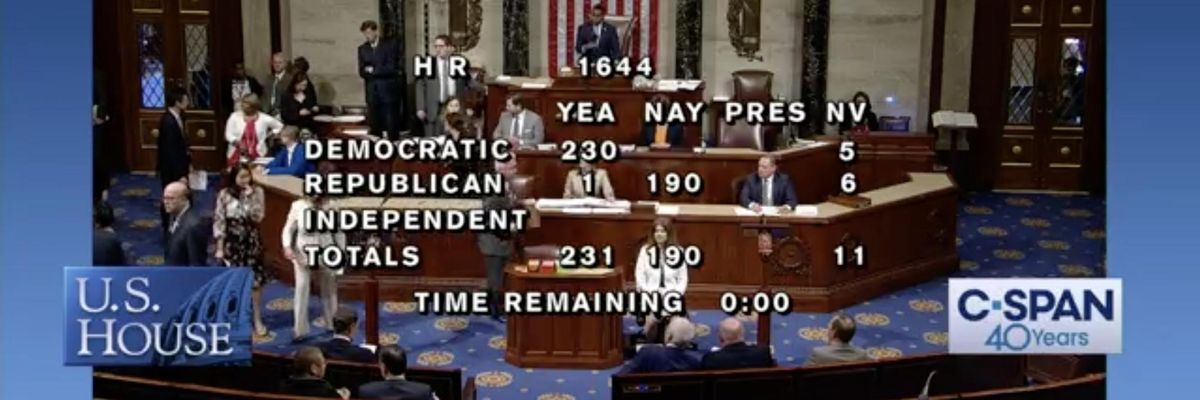Wednesday, April 10, 12:00pm:
Digital rights groups applauded Wednesday as the U.S. House passed the Save the Internet Act (H.R. 1644), in a 232-190 vote, with just one Republican joining the Democrats in supporting the legislation.
"Today's vote is a tremendous victory for the millions of people across the country who've been calling, writing, tweeting and visiting their members of Congress to urge them to fight for a free and open internet," Free Press president Craig Aaron said in a statement. "The energy behind this bill came from the grassroots, not big companies, but there were plenty of industry lobbyists trying to sink it. The overwhelming show of support for the Save the Internet Act proves how important and popular Net Neutrality has become."
The bill will now go to the Senate for a potential vote. Advocates warned Senate Majority Leader Mitch McConnell against following through on his earlier statement that the bill would be "dead on arrival in the Senate if it passed the House.
"Senators must know by now that people across party lines support Net Neutrality protections by large majorities," Aaron said. "Mitch McConnell and other Senate leaders need to decide whether they're going to stand with more than 80 percent of voters in their own party or do the cable companies' dirty work. To prevent a Senate vote on this bill would be wrong, politically short-sighted and an underestimation of the internet's readiness to mobilize and fight for Net Neutrality."
Earlier:
Digital rights activists stood fast for net neutrality Wednesday despite Senate Majority Leader Mitch McConnell's dismissal of the widespread support of the Save the Internet Act, citing the millions who tuned in to watch the U.S. House vote over the bill.
As the House prepared to vote, the Kentucky Republican said that regardless of the outcome, the Save the Internet Act (H.R. 1644) would be "dead on arrival in the Senate."
"President Trump and Mitch McConnell can say whatever they want, but the writing is on the wall: there is overwhelming public consensus in support of real net neutrality and it's only a matter of time before we win," said Evan Greer, deputy director of the internet freedom group Fight for the Future.
The public consensus was illustrated by the five million viewers who Fight for the Future said had already tuned into the group's marathon livestream, where public interest groups along with celebrities including Tom Morello of Rage Against the Machine were among those making cameos, urging Americans to call their representatives and tell them to vote "yes" on H.R. 1644.
Watch:
"The politicians standing in the way of internet freedom are embarrassing themselves--they'll go down in history as incompetent, corrupt, and out of touch," said Greer. "Republican, conservative, and libertarian voters don't want their cable company to control what websites or apps they can visit or where they can get their news."
The bill currently has the support of 214 House members, and needs the support of four more to pass.
As Fight for the Future wrote on Twitter, representatives aligned with the telecom industry are expected to try to water down the legislation instead of ensuring strong protections against the throttling or blocking of internet content.

